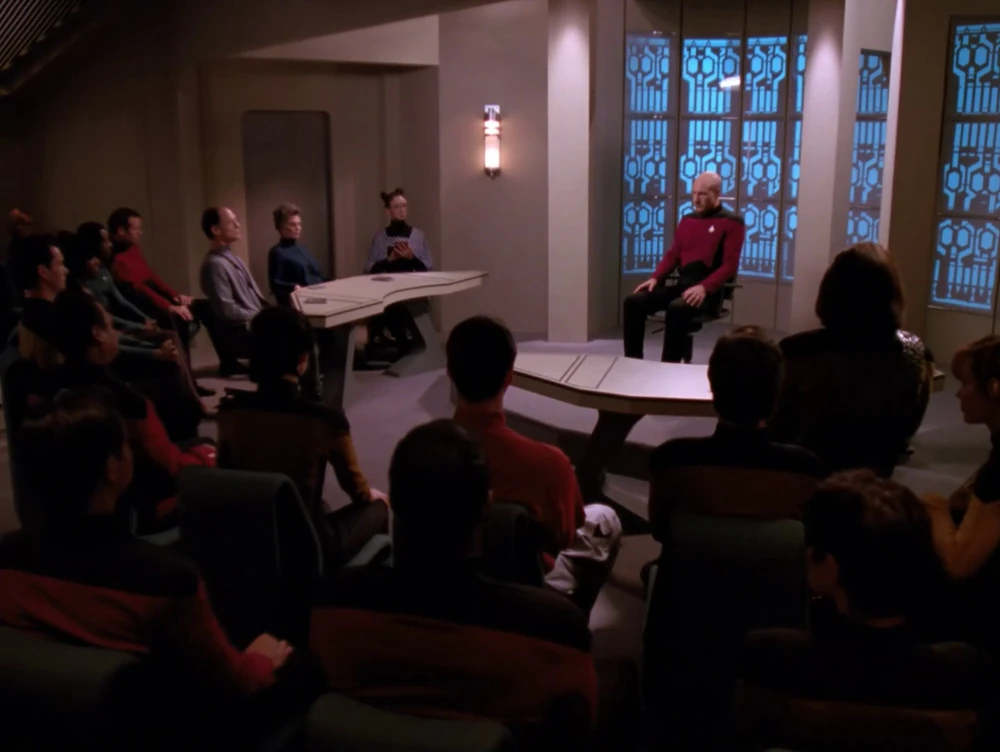The Drumhead: A Cautionary Tale for Our Times

“The true test of a free society is not how it treats its friends, but how it treats those it fears.”*
Star Trek: The Next Generation has always been more than just a sci-fi show; it’s a mirror held up to our own world. Few episodes reflect that mirror more clearly than Season 4’s The Drumhead — a story about how fear, once unleashed, can corrode justice from the inside out.
The Unraveling of Justice
In The Drumhead, a Klingon exchange officer is accused of sabotage aboard the Enterprise. Admiral Norah Satie, a celebrated Starfleet prosecutor, arrives to investigate. At first, her mission seems noble: protect the ship, uncover the truth.
But the investigation quickly mutates. Evidence becomes optional. Accusations multiply. Loyalty is measured not by facts, but by how loudly one condemns the accused. Even crew members with spotless records are dragged into suspicion.
The real danger isn’t the alleged saboteur — it’s the tribunal itself. The principles of due process, presumption of innocence, and fair trial are quietly replaced by fear, loyalty tests, and guilt by association.
Sound familiar?
“The road from legitimate suspicion to rampant paranoia is much shorter than we think.” — Captain Picard
💬 Core Line of the Episode:
This quote is the heartbeat of the story. It’s not just a warning; it’s a map of how quickly fear can warp justice.
The Warning from Picard
Picard’s exchanges with Worf in the episode are the moral heart of the story:
Worf: “Sir, the Federation does have enemies! We must seek them out!”
Picard: “Oh, yes. That’s how it starts. But the road from legitimate suspicion to rampant paranoia is very much shorter than we think. Something is wrong here, Mr. Worf; I don’t like what we have become.”
By repeating this idea, the episode drives home that paranoia doesn’t arrive all at once — it creeps in, disguised as vigilance, until it becomes the default lens through which we see the world.
Echoes in 2025
In 2025, The Drumhead feels less like a warning from the past and more like a diagnosis of the present. We see it when:
- Social media pile-ons destroy reputations before facts emerge.
- Political opponents are branded as traitors rather than debated as equals.
- Identity and ancestry are used as proof of guilt, echoing Simon Tarses’ persecution for his Romulan heritage.
- Leaders promise to “root out” enemies, but the definition of “enemy” keeps expanding.
- Algorithms reward outrage, amplifying fear and suspicion faster than truth can catch up.
The tools have changed — hashtags instead of courtrooms, viral videos instead of sworn testimony — but the pattern is the same. Fear narrows our vision until we see only threats, and in defending our ideals, we destroy them.
Why We Fall for Witch Hunts
The episode also reveals why this happens — and why it’s so hard to stop:
- Fear unites people against a common enemy, real or imagined.
- Moral certainty convinces us that extreme measures are justified.
- Simple answers feel comforting in a complex world.
- Power is intoxicating, even for those who start with good intentions.
Admiral Satie doesn’t see herself as a villain. That’s the danger — witch hunts rarely begin with malice. They begin with conviction.
Upholding Core Principles
Picard resists not because it’s easy, but because it’s necessary. He knows that true security comes from protecting the very freedoms fear tempts us to abandon.
His final reminder to Worf is as relevant now as it was in the 24th century:
“Vigilance, Mr. Worf. That is the price we have to continually pay.”
Vigilance doesn’t just mean watching for enemies — it means watching ourselves, our leaders, and our own impulses.
What We Can Do
The lesson of The Drumhead isn’t just for governments or institutions — it’s for all of us. In an age where outrage is currency and suspicion spreads at the speed of a click, we can:
- Pause before sharing unverified claims.
- Defend due process even for people we dislike.
- Seek out opposing viewpoints to test our own assumptions.
- Resist leaders who promise absolute safety at the cost of liberty.
- Remember that disagreement is not disloyalty.
Historical Parallels
The episode draws on the Salem witch trials, the McCarthy hearings, and countless other moments when fear overpowered reason. History shows us that no society — no matter how advanced — is immune.
The Final Word
The Drumhead is more than a Star Trek episode. It’s a mirror, a warning, and a challenge.
The line between vigilance and paranoia is razor-thin. Cross it, and we don’t just lose our enemies — we lose ourselves.